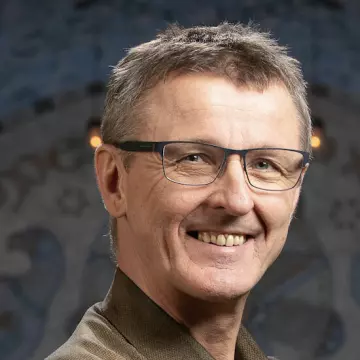Denne artikkelen er publisert både på norsk og engelsk. Den norske versjonen finner du her.
Lynn Nadel, professor of psychology and a
leading figure in cognitive neuroscience, speaks with the weight of decades in
academia. He worked closely with John O’Keefe for many years; in 1978 they
co-authored The
Hippocampus as a Cognitive Map. In
2014, O’Keefe won the Nobel Prize together with May-Britt and Edvard Moser.
Nadel has spent his life in science, much of
it outside the U.S. Now he and his wife are in Trondheim, visiting longtime
research colleagues and keeping up with developments at the Kavli Institute. They
will return to America once their stay is over, but not for long.
“We’ve applied for a long-term visa to
Australia, where our daughter lives. For now, that’s where we intend to stay,”
he explains.
The Nadels have many children and
grandchildren, and he is actively trying to persuade all of them to leave the
U.S.
“America is deeply divided. Civil war is now a
real possibility. Things could turn ugly – fascism is not out of the question.
Something like Argentina in its darkest years. On top of insane polarization,
more and more people are arming themselves. That alone is reason enough to
leave,” Nadel warns.
“You don’t want to wait until the worst has
already happened.”
“Two nations living in separate realities”
The United States, he says, has effectively
become two separate countries, living in different realities, guided by
opposing values of what is ethically acceptable.
“If it were physically possible to split the
two nations geographically—like India and Pakistan after partition—I think we’d
already see a movement in that direction. But people are too mixed together.
Blue people live in red states, and vice versa.”
UA spoke with Lynn Nadel because he has been
organizing and motivating faculty at American universities to push back against
Trump and the MAGA movement’s assault on higher education. He makes no secret
of how bleak he sees the situation—and insists it’s not just about Trump.
“Donald Trump is not responsible for the
situation America finds itself in. He’s not even the main explanation,” says
Nadel.
The roots go back decades: failing schools,
staggering inequality.
“Thirty to forty percent of Americans live
literally paycheck to paycheck. Our education levels are far below Europe’s. We
fight wars across the globe—some for the right reasons,
but many for the wrong ones. What Trump has done is accelerate the worst
tendencies in our national character. But those traits were there long before
him.”
“Moronic, with an uncanny ability to
manipulate”
So how does a psychologist and neuroscientist
describe Donald Trump as a person?
“He is sui generis—a unique character.
Intellectually, he’s moronic. He doesn’t read, not even the briefs he’s given
as president. He doesn’t care about new information, seems incapable of
changing his mind. His views and ideas are entirely shaped by the circles he’s
moved in. But politically, in the emotional arena, he’s very effective. He has an uncanny ability to manipulate people
emotionally,” Nadel observes.
MAGA supporters see universities as hotbeds of
liberalism, wokeness, and leftist ideas. Is there some truth to that?
“That attitudes grouped under woke have clashed with MAGA positions on campuses—I
can believe that. Sometimes in clumsy ways. But it should surprise no one that
80 to 90 percent of faculty lean liberal. That’s what education does: it opens
minds to more liberal perspectives on the world. That’s the purpose of
universities—to open minds. Which is exactly what MAGA doesn’t want to happen,”
Nadel argues.
“An assault on institutions of knowledge”
American universities, like others across the
Western world, face declining birthrates and fewer students. Many smaller
institutions have already closed. The big prestige universities have so far
survived by admitting more international students, whose tuition has helped
keep budgets afloat. But that, too, is changing as borders tighten.
And the problem is compounded by geography:
most of the elite universities are in blue states, making them prime targets
for Trump.
Is there an overarching plan behind Trump-era
attacks on academia?
“The plan is to dismantle institutions that
promote liberal values. That means universities
and, museums—and also the
federal civil service, which is our equivalent
of the ‘Mandarin class.’ These are highly trained
professionals, many educated at the
same elite universities, the backbone
of government. That’s what MAGA labels the ‘deep state.’”
If that project succeeds, Nadel warns, America
will become a less interesting country for the rest of the world—more like
Argentina, where life can be lived but where the atmosphere is far from
welcoming.
“When is it too late to leave?”
It’s why Lynn Nadel has no intention of living in the U.S. in the short term.
“I’m of Jewish descent. It’s hard not to think
of Europe in the 1930s when I see what’s happening in America today. The
choices Jewish families in Germany had to make … When is it too late to leave?
People keep hoping, waiting as long as they can. Then something terrible
happens, the doors close, and it’s too late. So my wife and I will stay away
for a few years—at least until we see how things develop.”


























